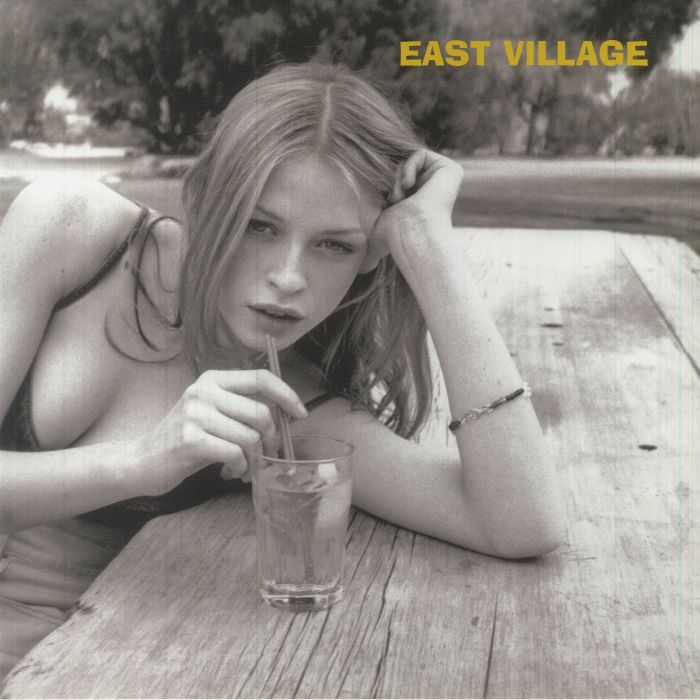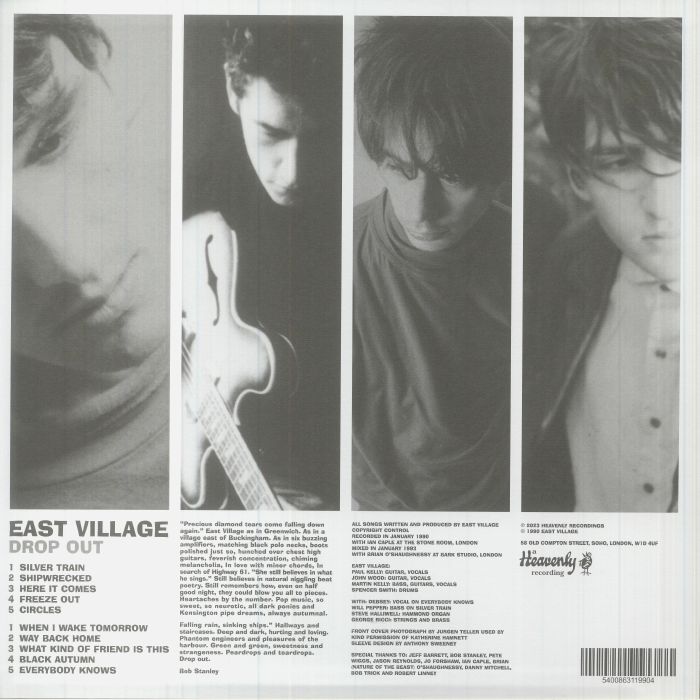DESCRIPTION:
Indie Rock, Indie Pop LP 30th Year Anniversary Copy- Deluxe Pressing + 24 Track Digital Download
An autumnal treasure, East Village’s Drop Out has spent the past thirty years finding new ears to bewitch and new hearts to melt. The only album from this British four-piece, recorded and released in the early nineties, it’s long been considered one of the hidden jewels of its time, and is talked of with hushed reverence by people who know. Bob Stanley of Saint Etienne once called it “an elegy for a particular brand of eighties guitar music, sweet minor chords and Dylanesque lyrics”, which captures what makes it so special; in summarising its era, though, it also effortlessly transcends it.
Like all great guitar gangs, East Village fell together as a four-piece; having relocated from High Wycombe to London in mid ‘80s, brothers Martin and Paul Kelly on bass and guitar, set on forming a group together, were joined by John Wood (guitar) and Spencer Smith (drums). Wood and the Kellys shared writing and vocal duties; it was an ideal combination, and one of the many charms of East Village is their various song writing voices, a tip of the hat, seemingly, to the 60s folk-rock groups who influenced them.
Originally influenced by garage-rock and freakbeat, the band eventually came through via the same scene as groups like Felt, The Go-Betweens, The Weather Prophets, and Primal Scream. They’d formed as Episode Four, releasing an EP, Strike Up Matches, in 1986, which has gone on to become one of most sought after releases of the C86 era. Their first two singles as East Village, ‘Cubans In The Bluefields’ (1987) and ‘Back Between Places’ (1988), were released on Jeff Barrett’s Sub Aqua label.
When it came time to record Drop Out, East Village found a supporter in Bob Stanley, who bankrolled the album sessions until Barrett re-signed the band to his new imprint Heavenly Recordings in 1990. The album that took shape is dusky, heartfelt, lamplit, full of chiming minor chords, close harmonies, rattling organs, all buoyed by a rhythm section that moves as one, steady and elegant. There’s melancholy here, certainly, on songs like ‘What Kind Of Friend Is This’, but also pleasure and freedom, on ‘When I Wake Tomorrow’ and ‘Silver Train’. The group were obsessed with Dylan’s Eat The Document at the time, and the album’s rich with references to the film; Drop Out’s character is also somehow close to the thin wild mercury sound of Blonde On Blonde, and the lambent light of the Byrds’ Notorious Byrd Brothers.
It's also an album that’s slowly accrued its own legend. From its stunning cover art, photographed by Juergen Teller originally for a Katherine Hammett campaign, to the ten perfectly formed songs within, Drop Out’s significance in the scheme of things is such that, a decade ago, it was given a rare 10/10 rating in Uncut magazine, who called the album “the lost classic of its era”. Drop Out comes round every decade or so, each edition introducing new fans to its understated beauty, and this latest reissue is its most elegant and deluxe yet
Please note the information is done on a artist keyword match and data is provided by LastFM.

East Village, essentially a duo featuring brothers Martin Kelly and Paul Kelly, stood out from the drug-infused, rave-obsessed U.K. music scene of the late ‘80s by championing the ‘60s jangle of the Byrds and early Beatles. Actually formed in the mid-‘80s as Episode 4, East Village had a retro, unfashionable style that only really caught on right before they broke up. Eventually joined by Johnny Wood (guitar) and Spencer Smith (drums), East Village released two singles on Sub Aqua and toured with the House of Love and McCarthy. However, when Sub Aqua folded, the band was out of a label and had no money to finance their debut album. A friend of the group paid for the recording of the LP, but it remained unreleased until Heavenly picked it up in 1993. Called Drop Out, it didn't appear until the band was no longer together; the group had already disintegrated onstage at a sold-out concert in London. Paul Kelly later collaborated with Deborah Wykes as Birdie.
East Village are one of the great lost bands, a group whose music has only grown in stature since their premature demise in the spring of 1991. Along with other legendary bands like Big Star and The Action, who also failed to fully stamp their mark whilst active, East Village made pop music that was timeless, but out of step with the musical environment around them.
Originally named Episode Four, the band was formed in the mid-1980s by brothers Martin and Paul Kelly in the sleepy Buckinghamshire market town of Princes Risborough just forty miles to the west of London. They were soon joined by Johnny Wood (guitar/vocals) and Spencer Smith (drums) and by 1986 they had forged their brilliant, classic pop sound and recorded their first release, the "Strike Up Matches" EP, which has gone on to become one of the most sought after releases of the C86 era.
By 1987 they had renamed themselves East Village and relocated to London where they recorded two EPs for Jeff Barrett's Sub Aqua label. The band gigged extensively through 1988 and 1989, including tours with The House Of Love and McCarthy. The 1989 collapse of Sub Aqua left the band without a label, but they recorded their debut album using money loaned by Bob Stanley, and were soon re-united with Jeff Barrett on his new Heavenly label, releasing their classic single "Circles." Just as interest in the band was building East Village played a sold out show at the New Cross Venue in South London only to end the set by splitting up on stage.
The album that followed, "Drop Out" (1993), was mixed and released posthumously on Heavenly and has gone on to be hailed as a classic of its genre. The years that followed saw East Village gain a cult status amongst fans of indie music and prices of original pressings rose rapidly as demand outweighed supply. A singles compilation, "Hotrod Hotel," was released to great acclaim by Summershine in 1994
https://slumberlandrecs.bandcamp.com/album/hotrod-hotel
Read more on Last.fm. User-contributed text is available under the Creative Commons By-SA License; additional terms may apply.


